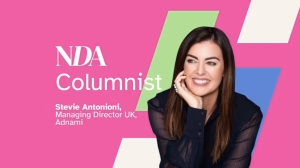by Molly Towers Mode, Senior Associate Director – Planning, and Tatenda Nyamande, Account Planner, at EssenceMediacom
There are many women’s sports fans in the UK, existing across communities, generations and genders. The particular resonance women’s sports have with to the LGBTQ+ community present brands with an opportunity to drive cultural relevance in campaigns that live beyond Pride Month.
Kicking off: why women’s sports?
From England winning the Women’s Six Nations to The Netball Roses scoring silver at the Netball World Cup, not to mention the Lionesses’ World Cup Final against Spain, brands cannot overlook the impact women’s sports are having on mainstream culture.
Audiences are turning out en masse to support women’s teams. The FIFA Women’s World Cup Final was the second greatest TV event of 2023 (14.8 million live viewers, BARB), with the tournament attracting 29.9 million viewers in the UK.
The potential return for brands aligning with women’s sports is immense. Women’s sports sponsorships are +71% more likely to drive brand favourability compared to men’s sports sponsorships, and +21% more likely to generate purchase.
69% of FIFA Women’s World Cup fans saw brands sponsoring the tournament as more appealing, and 52% of those aware of Gucci’s partnership with Lioness Leah Williamson felt more positively about the brand as a result – the best performing partnership of all tracked.
Not only are women’s sports a viable opportunity for brands to connect with audiences in culture, but in doing so, brands are more likely to see positive business outcomes as a result.
Women’s sports: scoring with the LGBTQ+ community
The LGBTQ+ community love sports. So much so that 73% of lesbians and 77% of gay men have active lifestyles compared to the UK average of 63%.*
Countless role models have emerged from the sporting industry to champion LGBTQ+ issues, with female talent leading the charge. Take Alex Scott’s decision to wear the One Love armband whilst broadcasting the 2022 Qatar World Cup, Dame Kelly Holmes coming out in 2022 and making a documentary about the LGBTQ+ experience in the millitary, and cricketer Maxine Blythin championing the trans community.
23 female athletes featured in last year’s annual 50 marketable athletes report, of which many are openly LGBTQ+ including Megan Rapinoe, an icon of the US Women’s National Team and activist for equality in the sporting industry.
It is hardly a surprise that women’s sports therefore are loved by the LGBTQ+ community. In fact, they are +71% more likely to prefer watching women’s sports over men’s sports.
For brands looking to align with the LGBTQ+ community, women’s sports must be considered, as an authentic cultural entry point.
How brands can win
Though women’s sports have mass appeal, audiences are more likely to be diverse and therefore more receptive to brands delivering campaigns with true authenticity.
There are many ways for brands to get involved in women’s sports and align with the LGBTQ+ community, from large-scale sponsorships to contextual content partnerships, but to ensure a successful campaign, brands should be careful to avoid tokenism.
Brands should take the time to understand the audience and intersection between communities that may exist within it. Ensuring that messaging speaks to these intersectional identities will not only deliver cultural relevance, but could increase the creative effectiveness too. Recent research from System 1 analysing FIFA Women’s World Cup ads found them not only to be more effective than comparable ads from the Qatar Men’s World Cup, but those with intersectional representation performed best.
Championing female athletes will connect directly with their LGBTQ+ fanbases, and brands can leverage the authentic voices from the athletes themselves to ensure campaigns are meaningful. Girls want to see more high-profile female athletes in the media, an opportunity for brands to be part of inspiring future generations, particularly for young LGBTQ+ people with female sporting role models.
To conclude, for brands looking to connect with LGBTQ+ audiences, women’s sports are an exciting cultural entry point that offer both reach and scale, and access to a loyal, diverse fanbase. Authenticity is key to unlocking a successful, meaningful campaign, and for brands that get it right, fans are happy to reward.











